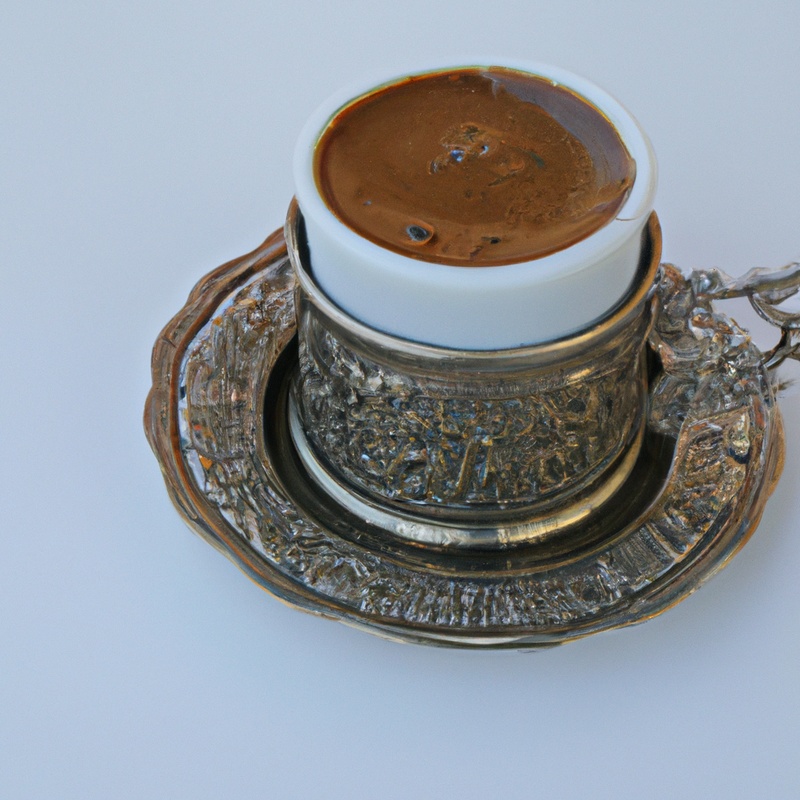Key Takeaways:
- Siphon brewers are not optimal for making Turkish coffee due to their design and brewing method.
- Turkish coffee requires a specific brewing process to achieve its traditional taste and texture.
- Using a siphon brewer for Turkish coffee may result in a different flavor profile and texture, deviating from the traditional experience.
- It is recommended to use a cezve, a traditional Turkish coffee pot, for the best results when making Turkish coffee.
Have you ever wondered if you can use a siphon brewer to make the rich and velvety concoction known as Turkish coffee? Well, you’re not alone.
Turkish coffee, with its centuries-old traditions and cultural significance, has intrigued coffee lovers around the world.
But is it possible to achieve the same intense flavor and unique brewing experience with a siphon brewer? In this article, we’ll explore the similarities and differences between siphon brewing and traditional Turkish coffee brewing methods, uncover the challenges and considerations, and even delve into alternative brewing methods.
So, grab your cup and let’s embark on this flavorful journey together!
What is Turkish coffee?
Turkish coffee is a traditional method of brewing coffee that originated in Turkey and is characterized by its strong, finely ground coffee beans and unique preparation process.
Brief history and cultural significance of Turkish coffee
Turkish coffee has a rich history and holds significant cultural importance. Dating back to the 16th century, it originated in the Ottoman Empire and quickly became a beloved and integral part of Turkish culture.
Its brewing method involves using a special pot called a cezve, where finely ground coffee beans are boiled with water and sugar to create a thick and flavorful beverage.
The coffee is traditionally served in small cups accompanied by a glass of water and Turkish delight. Turkish coffee is more than just a drink; it symbolizes hospitality, friendship, and socializing.
It is often shared with friends and family during social gatherings and special occasions.
The process of preparing and serving Turkish coffee is considered an artform, with specific rituals and customs that have been passed down through generations. Moreover, Turkish coffee holds a distinct place in the UNESCO Intangible Cultural Heritage list as an important element of Turkish culture.
It is a unique and authentic experience that allows you to savor the rich flavors and immerse yourself in the customs and traditions of Turkey.
So, if you want to delve into the history and culture of Turkey, trying Turkish coffee is a must-do.
Characteristics of Turkish coffee
Turkish coffee is a unique and traditional beverage with distinct characteristics.
Here are some key features of Turkish coffee:
- Finely Ground: Turkish coffee is ground to a powder-like consistency, almost like flour, which allows for a rich and robust flavor.
- Strong and Bold: Turkish coffee is known for its intense and strong taste. It is bold in flavor, with a full-bodied profile that can be quite stimulating.
- Unfiltered: Unlike other brewing methods, Turkish coffee is not filtered. As a result, the coffee grounds are present in the cup, adding extra texture and richness to the drink.
- Sweetness and Aroma: Turkish coffee is typically prepared with a small amount of sugar, which adds a natural sweetness. It also has a distinct aroma that fills the room and enhances the overall experience.
- Served in Small Cups: Turkish coffee is traditionally served in small cups, allowing you to savor the concentrated flavors. It is usually enjoyed alongside a glass of water to cleanse the palate between sips.
- Ritual and Tradition: Turkish coffee holds a special place in Turkish culture and is often prepared and served with great care. It is considered more than just a drink; it is a part of social rituals and an expression of hospitality.
These characteristics make Turkish coffee a one-of-a-kind experience that is cherished by many coffee enthusiasts.
So, if you’re looking to try something new and different, don’t miss out on the unique flavors of Turkish coffee!

How is Turkish coffee traditionally brewed?
Turkish coffee is traditionally brewed by simmering finely ground coffee beans with water in a special pot called a cezve, and served unfiltered in small cups.
Overview of traditional Turkish coffee brewing process
The traditional Turkish coffee brewing process begins by grinding the coffee beans into a very fine powder.
Then, cold water is added to a small pot called a cezve, along with the desired amount of finely ground coffee and sugar (optional).
The mixture is slowly heated over low heat, allowing the coffee to dissolve and create a layer of foam on top.
Once the coffee begins to boil, it is removed from the heat and allowed to settle before being poured into small cups.
The process is all about taking your time and savoring each step, resulting in a rich and flavorful cup of Turkish coffee.

Equipment and tools used in Turkish coffee brewing
When brewing Turkish coffee, you’ll need a few specific equipment and tools.
Here’s what you’ll need:
- Ibrik/Cezve: This is a small, long-handled pot specifically designed for Turkish coffee brewing. It usually has a wide base and a narrow opening at the top.
- Coffee Grinder: Turkish coffee requires a very fine grind, almost like powder. So, you’ll need a grinder that can achieve this consistency. A manual burr grinder or an electric grinder with a Turkish coffee setting will work.
- Coffee: Turkish coffee is made using finely ground Arabica coffee beans, ideally medium to dark roast.
- Water: Use cold, filtered water for the best results.
- Sugar (optional: Turkish coffee is typically brewed with some sugar. You can adjust the sweetness to your preference.
- Heat source: You’ll need a heat source like a stove or a gas burner to heat the ibrik.
That’s pretty much all the equipment and tools you need to get started with brewing Turkish coffee.
Enjoy your cup of rich and flavorful coffee!
What is a siphon brewer?
A siphon brewer is a unique coffee brewing device that uses a combination of heat, pressure, and vacuum to produce a clean and flavorful cup of coffee.
Explanation of what a siphon brewer is and how it works
A siphon brewer, also known as a vacuum pot or a syphon coffee maker, is a unique and fascinating coffee brewing device. It consists of two chambers, one on top and one below, connected by a tube.
The bottom chamber is filled with water, which is heated to a specific temperature.
As the water heats up, it creates vapor pressure, forcing the water to rise into the upper chamber. Once the heat is removed, the brewed coffee is pulled back down through a filter due to the vacuum created.
This process produces a clean and flavorful cup of coffee, often described as smooth and aromatic.
Advantages and disadvantages of using a siphon brewer
Advantages of using a siphon brewer:
- Enhanced Flavor: The unique brewing process of a siphon brewer extracts flavors with precision, resulting in a rich and aromatic cup of coffee.
- Visual Experience: Watching the brewing process unfold in a siphon brewer can be captivating and adds an element of theater to your coffee brewing routine.
Disadvantages of using a siphon brewer:
- Complexity: Siphon brewers require more attention and skill compared to other brewing methods. The setup, cleaning, and brewing process can be time-consuming and daunting for beginners.
- Fragility: Siphon brewers are typically made of glass, which makes them prone to breakage if mishandled or dropped.
Remember to weigh the advantages and disadvantages based on your preferences and brewing expertise to determine if a siphon brewer is the right choice for you.

Can a siphon brewer be used for making Turkish coffee?
A siphon brewer can be used for making Turkish coffee, but there are some important considerations and challenges to keep in mind.
Exploring the similarities and differences between siphon brewing and traditional Turkish coffee brewing methods
Siphon brewing and traditional Turkish coffee brewing have some similarities and differences.
Similarities include the use of water and coffee grounds, as well as the need for a heat source.
However, the brewing methods differ.
Turkish coffee involves boiling finely ground coffee in a cezve, while siphon brewing uses a vacuum pot to heat and extract flavors through vapor pressure.
Turkish coffee has a rich, thick texture, while siphon brewed coffee tends to be cleaner and lighter in body.
It’s important to note that both methods produce unique and delicious cups of coffee.
Challenges and considerations when using a siphon brewer for Turkish coffee
Using a siphon brewer for Turkish coffee can present some challenges.
Firstly, the brewing process of the siphon brewer is different from the traditional method used for Turkish coffee.
This can affect the taste and texture of the coffee.
Secondly, the siphon brewer may not be able to produce the fine grind required for Turkish coffee, resulting in a weaker flavor.
Lastly, the siphon brewer may not provide the same level of control over the brewing parameters, such as water temperature and brewing time, as a traditional cezve would.
Alternative brewing methods for Turkish coffee
Other than the traditional cezve method, there are a few alternative brewing methods that you can use for making Turkish coffee.
Pros and cons of using different brewing methods
Using different brewing methods for coffee comes with its own set of pros and cons. Here are some of the advantages and disadvantages of various brewing methods:
1. French Press:
Pros:
- Produces a bold and robust flavor.
- Easy to use and requires minimal equipment.
- Allows for full extraction of oils and flavors from the coffee beans.
Cons:
- May result in some sediment in the final cup of coffee.
- Requires a longer brewing time compared to other methods.
2. Pour Over:
Pros:
- Provides precise control over factors like water flow and extraction time.
- Creates a clean and smooth cup of coffee with bright flavors.
- Allows for experimentation with different coffee grounds and water ratios.
Cons:
- Requires more manual effort and attention to detail.
- Can be time-consuming, especially for larger batches of coffee.
3. Espresso Machine:
Pros:
- Produces a concentrated and rich coffee flavor.
- Creates a creamy and frothy layer on top (crema.
- Allows for the preparation of specialty coffee drinks like lattes and cappuccinos.
Cons:
- Can be expensive to purchase and maintain.
- Requires learning and mastering the technique for consistent results.
- Limited brewing capacity for larger groups.
4. Aeropress
Pros:
- Provides a quick and convenient brewing method.
- Easy to clean and portable for on-the-go coffee lovers.
- Allows for experimentation with different brewing techniques.
Cons:
- Produces a smaller serving size, suitable for individual consumption.
- May result in a milder flavor compared to other brewing methods.
Remember, the best brewing method for you will depend on your preferences, convenience, and the equipment you have available. So, feel free to explore and find the method that suits you best!
Frequently Asked Questions about using a siphon brewer for Turkish coffee
Can I achieve the same taste and flavor with a siphon brewer?
Yes, you can achieve a similar taste and flavor with a siphon brewer when making Turkish coffee.
The siphon brewer allows for precise control over the temperature and brewing time, which are key factors in getting the right taste and flavor.
However, it’s important to note that the texture of Turkish coffee may be slightly different when brewed with a siphon compared to traditional methods.
So, while the taste and flavor can be similar, the overall experience might be a bit different.
What adjustments need to be made when using a siphon brewer for Turkish coffee?
When using a siphon brewer for Turkish coffee, there are a few adjustments you’ll need to make.
- Grind Size: Turkish coffee requires an extremely fine grind, much finer than what you would use for other brewing methods. Adjust your grinder accordingly or purchase pre-ground Turkish coffee.
- Water Ratio: Turkish coffee is traditionally brewed strong. Increase the amount of coffee grounds you use per cup of water to achieve a rich and bold flavor.
- Brewing Time: Turkish coffee is brewed by simmering it slowly over heat. Adjust the brewing time on your siphon brewer to match the traditional method of simmering for a longer period.
- Pot Size: Turkish coffee is typically brewed in a small cezve or ibrik. Use a smaller pot on your siphon brewer to ensure proper brewing and extraction.
Remember, adjusting these factors will help you achieve the authentic taste and experience of Turkish coffee with a siphon brewer. Happy brewing!
Are there any special tips or techniques for using a siphon brewer for Turkish coffee?
Using a siphon brewer for Turkish coffee may require some adjustments.
Here are a few tips and techniques to keep in mind:
- Use a finer grind: Turkish coffee requires an extra-fine grind, so make sure your coffee beans are ground to a powder-like consistency. This helps with extraction and ensures a rich and flavorful cup.
- Pay attention to water temperature: Turkish coffee is traditionally brewed with very hot water, around 160-170°F (71-77°C. The siphon brewer may not reach this temperature, so you can preheat the water or let it boil for a bit longer before starting the brewing process.
- Practice patience: Turkish coffee is known for its strong flavor and thick sludgy texture. Allow the coffee to brew slowly, taking your time to savor the process and fully extract the flavors. Be prepared for a unique brewing experience!
- Serve it traditionally: Turkish coffee is often enjoyed with a pinch of cardamom and served unfiltered in small cups. It’s customary to let the coffee settle for a few minutes before drinking to allow the grounds to settle at the bottom of the cup.
Remember, brewing Turkish coffee with a siphon brewer may require some trial and error to achieve your desired taste.
Enjoy the process and experiment with different techniques until you find the perfect cup!
Final Verdict
While Turkish coffee has a rich history and cultural significance, it can be challenging to replicate its unique characteristics using a siphon brewer. The traditional Turkish coffee brewing process involves specific equipment and techniques that are not easily replicated with a siphon brewer.
However, alternative brewing methods such as the ibrik or cezve can be used to achieve similar results.
If you’re a fan of Turkish coffee and want to experiment with different brewing methods, it’s worth exploring these alternatives. Remember to make adjustments and follow specific tips and techniques for the best results.
Happy brewing!
